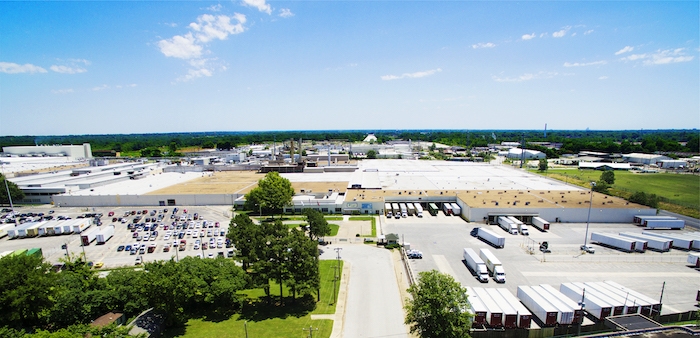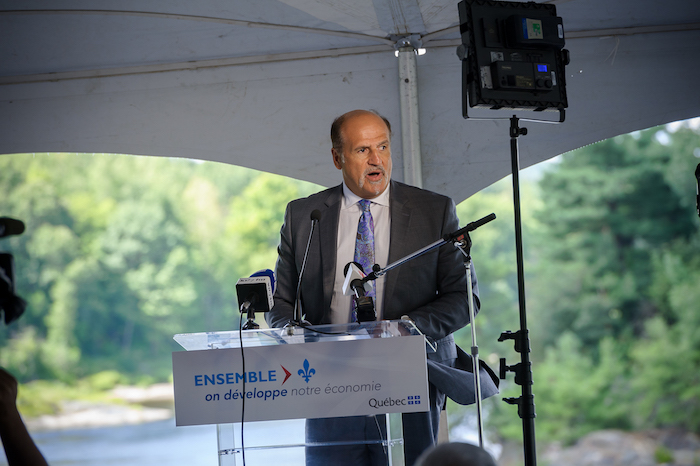
Features
Equipment & Systems
Paper
Pulp
Tissue
Kruger’s big deal
We talk to the CEO of Kruger Products about the company's $575-million investment to construct a new tissue facility in Canada
April 29, 2019 By Kristina Urquhart
 Kruger's first TAD facility in Memphis
Kruger's first TAD facility in Memphis At a time when many Canadian pulp and paper companies are looking to diversify their existing operations, Kruger Products is opening a brand new one.
In August 2018, Kruger Products, along with its publicly traded entity, KP Tissue Inc., announced a $575-million investment to build a new state-of-the-art tissue making plant in the Brompton neighbourhood of Sherbrooke, Quebec, adjacent to an existing Kruger Inc. specialty papers facility. The new plant will create 180 permanent jobs and house Canada’s largest through-air-dry (TAD) machine, which manufactures ultra-premium tissue.
This injection is just one of the latest investments that the Kruger Group has made over the last two years. In August 2017, a new $55-million paper machine started up at the Kruger Products plant in Crabtree, Quebec. And in September 2017, Kruger Inc. poured $377.6 million into diversifying its Brompton and Wayagamack, Quebec newsprint operations into production for specialty products, including labelling, digital printing and flexible food packaging.
All of these activities strengthen the company’s foothold in the Canadian market – where Kruger Products accounts for about one-third of all tissue sold in the country and where Kruger Products makes up 45 per cent of all available consumer trademark tissue brands. “It’s a testament to our history that we are investing and building in Canada despite other strong location options in North America,” says Dino Bianco, CEO of Kruger Products. “Our roots are in Canada. That says a lot about us as a business and who we are.” Kruger Products employs 2,500 people – including 2,000 in Canada – and has been recognized as a top employer in the Greater Toronto Area (GTA) for seven consecutive years.
Ready for expansion
Kruger Inc., the majority shareholder of Kruger Products, was founded in 1904 and manufactures specialty papers, containerboard products and corrugated packaging, as well as cellulosic biomaterials, renewable energy, and wine and spirits. Additionally, it operates recycling and real estate divisions.
Kruger Products, the tissue division, specializes in bathroom tissue, facial tissue, paper towels and napkins for commercial, industrial and consumer use under brands including Cashmere®, Purex®, SpongeTowels®, Scotties® and others. The company manufactures tissue at all quality levels from value to ultra-premium for both retail and away-from-home markets in Canada and the United States.
The premium tissue segment is growing by two to three per cent every year, with an affinity in the market for the ultra-premium products. “We are running close to capacity,” Bianco notes. “If we’re going to be a competitive player going forward, then we need to add more capacity and particularly in the premium/ultra premium segment.”
As the primary technology used to manufacture ultra-premium tissue, TAD is considered the gold standard for the segment. Kruger Products is making this multi-million-dollar investment despite a challenging cost environment.
The cost of pulp on both softwood and hardwood has moved to near-record levels, and freight costs, while levelling out over the past few months, remain high. Analysts predict pulp prices will remain relatively stable this year after a slower start, with underlying demand from China ready to hit as soon as the U.S.-China trade conflict is settled.
“Many people have asked me why would we invest in a new facility when industry costs are high and our margin structure is under pressure. And my point is it’s the best time to do so,” says Bianco. “If you can make the economics work now, when the margin comes back or pulp subsides a bit, then you’re ready to hit the market with speed, innovation and quality.”
To cut costs and stay aligned with the market in advance of the new construction, Kruger Products raised prices at the end of 2017, and again a year later. The company also implemented a cost reduction program in 2018, which was about twice as aggressive as in years past, emphasizing less work-related travel, keeping vacancies open, renegotiating procurement contracts and deferring unnecessary maintenance.
“2018 was a tough year for all tissue manufacturers. With the speed and magnitude of pulp and freight cost increases, it was difficult for tissue manufacturers to respond quick enough to offset these costs,” says Bianco. “In 2019, we have priced our business and we are continuing to drive down costs through increasing capacity, improving efficiencies and reducing waste.”
Breaking ground
The centrepiece of the new Sherbrooke tissue plant will be the TAD machine, which is Kruger’s second such machine. Its first TAD machine is located at the Memphis, Tennessee facility.
TAD tissue is characterized by more bulk and softness than traditional tissue, and uses less fibre and water to manufacture. First, water is removed from the sheet with a vacuum before hot air blasts through it for structure. The sheet is then fed through a dry press, which imprints a pattern to produce a more pliable product. The TAD machine offers flexibility on sheet counts and roll diameters. The entire process uses more energy than alternative tissue-making methods, but those higher costs are offset by the reduction in fibre.
When shovels hit the ground this spring, the project will create one million worker hours for construction, with start-up expected in the first quarter of 2021. At maturity, the new plant will be able to produce 70,000 tonnes annually of tissue products.
After reviewing several sites in the U.S. and Canada for the facility, Kruger Products selected Sherbrooke for its proximity to the border, favourable hydro costs and the support of the Quebec government through Investissement Québec, the provincial government’s economic development department, which agreed to invest $105 million by way of a convertible debenture.
Currently, Kruger Products is securing suppliers and assets for the plant – including the paper machine – converting lines and associated equipment for pulp handling.

Dino Bianco, Kruger Products CEO
Minor upgrades
The Sherbrooke TAD will be capable of producing paper towel, bathroom tissue and facial tissue, with some new modifications to add heating and drying capacity and to increase efficiency on paper towel production. The converting lines will be flexible to produce a variety of pack sizes, including display packs and bonus packs. The team will install robotics in the plant where possible and use sensors to monitor assets and perform preventative maintenance.
“We don’t want to be bleeding edge, where we put in all the latest technology and then can’t use it,” Bianco explains. “And we don’t want to be losing edge – so we’re trying to manage where we’re going to invest now and where we can invest later once the technology is proven.”
Bianco says Kruger Products views the new Sherbrooke TAD machine as a North American asset rather than just a Canadian one. Using the two TAD machines in tandem, the company can optimize production for longer runs, and have the ability to make its supply chain more efficient.
A proven model
Bianco cites Kruger’s Inc.’s project management experience and governance structure as integral to the project’s success.
New premium tissue capacities using TAD, NTT or ATMOS technology will be coming on stream elsewhere in the U.S. over the next few years, but so far, no others have been announced in Canada. Bianco says the growing demand in the premium segment, coupled with older assets being taken offline, will translate to the market capacity use remaining stable in the long term.
“Anyone can put in a TAD machine,” he says. “But we’ve got an incredibly strong supply chain, incredibly strong customer relationships, and strong brands. We have an integrated business model that allows us to leverage our whole footprint and all of our capabilities to be able to successfully utilize the capacity that comes out of that facility.”
The Sherbrooke TAD project is part of Kruger Products’ overall strategic five-year plan to connect more with its consumer and grow its product base, especially premium trademark in Canada and premium private label in the United States and Mexico.
“We’ve done this before. We know the technology and we know the infrastructure,” says Bianco. “It’s a little easier the second time.”
_____
This article originally appeared in the Spring 2019 issue of Pulp & Paper Canada.
Print this page